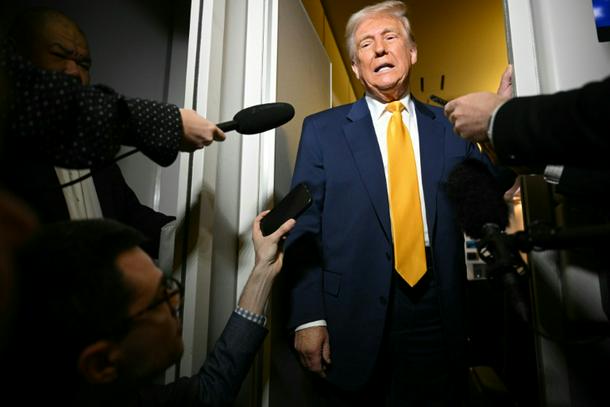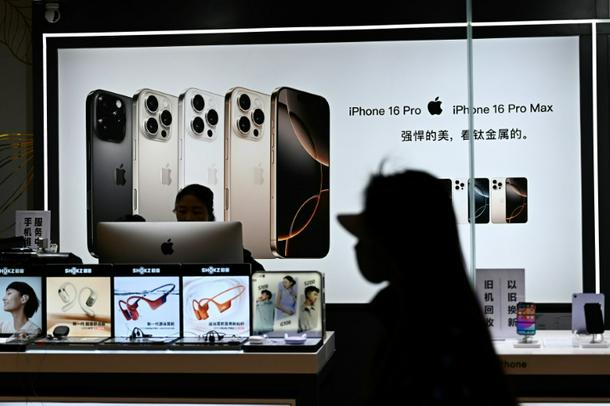
Trump's administration has said it intends to negotiate trade deals, including with China, but it is not clear what terms the president would be willing to accept
Washington (AFP) - US President Donald Trump warned Sunday that no country would be getting “off the hook” on tariffs despite a 90-day reprieve on some levies, while also downplaying exemptions for Chinese technology.
Global markets have been on a roller coaster since Trump’s April 2 tariffs announcement, declining sharply before partially recovering with his 90-day pause on the steepest rates last week.
Most nations will now face a baseline 10 percent tariff for the near-three-month period – except China, which launched a tit-for-tat escalation.
The exchanges have seen US levies imposed on China rise to 145 percent, and Beijing setting a retaliatory 125 percent band on US imports.
Trump’s administration has said it intends to negotiate trade deals, including with China, but it is not clear what terms the president would be willing to accept.
He has long said that US trade deficits are the result of unfair practices that need to be corrected, though his tariffs also hit countries with which the United States has a trade surplus.
“NOBODY is getting ‘off the hook’ for the unfair Trade Balances, and Non Monetary Tariff Barriers, that other Countries have used against us, especially not China which, by far, treats us the worst!” he wrote on his Truth Social platform Sunday.
In addition to the general reprieve for other countries, Trump on Friday issued exemptions for Chinese-made semiconductors and electronics, amid warnings that US consumers faced skyrocketing prices for products such as smartphones and laptops.
On Sunday, however, Trump asserted that there was “no Tariff ‘exception’” on those products, saying that they remained subject to a 20 percent rate in “a different Tariff ‘bucket.’”
Earlier, Beijing’s Commerce Ministry had said Friday’s move only “represents a small step” and insisted that the Trump administration should “completely cancel” the whole tariff strategy.
- Short-lived relief? -

The new tariff exemptions will benefit US tech companies like Nvidia and Dell as well as Apple, which makes iPhones and other premium products in China.
The relief could be short-lived, with some of the exempted consumer electronics targeted for upcoming sector-specific tariffs on goods deemed key to US national defense networks.
Trump has said he will give “very specific” details on Monday, and his commerce secretary, Howard Lutnick, said semiconductor tariffs would likely be in place “in a month or two.”
Lutnick said pharmaceutical products would “also be outside the reciprocal tariffs,” using an administration term for tariffs aimed at bringing all US trade imbalances to zero.
The White House says Trump remains optimistic about securing a deal with China, although US officials have made it clear they expect Beijing to reach out first.
Trump’s trade representative Jamieson Greer told CBS “Face the Nation” on Sunday that “we don’t have any plans” for talks between the US president and his Chinese counterpart Xi Jinping.
- China looks elsewhere -
China has sought to present itself as a stable alternative to an erratic Washington, courting countries spooked by the global economic storm.
Xi on Monday kicks off a five-day Southeast Asia tour for talks with the leaders of Vietnam, a manufacturing powerhouse, as well as Malaysia and Cambodia.
The fallout from Trump’s tariffs – and subsequent whiplash policy reversals – has sent particular shockwaves through the US economy, with investors dumping government bonds, the dollar tumbling and consumer confidence plunging.
Adding to the pressure on Trump, Wall Street billionaires – including a number of his own supporters – have openly criticized the tariff strategy as damaging and counterproductive.
The White House insists the aggressive policy is bearing fruit, saying dozens of countries have already opened trade negotiations to secure a deal before the 90-day pause ends.
“We’re working around the clock, day and night, sharing paper, receiving offers and giving feedback to these countries,” Greer told CBS.